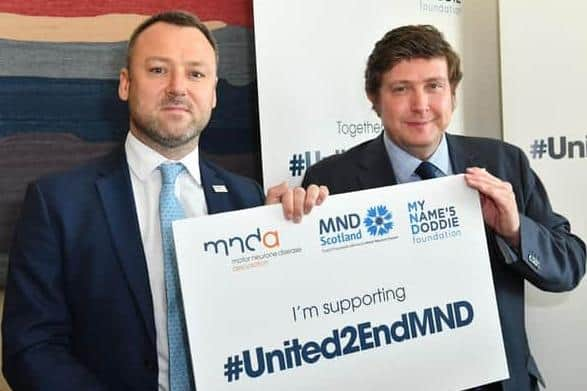Andrew Lewer MP: 'Victory for Motor Neurone Disease researchers is one of my proudest achievements'
and live on Freeview channel 276
Motor Neurone Disease is a cruel disease for which there is currently no cure, and receiving formal diagnosis feels earth shattering for many. It is a fatal, rapidly progressing disease that affects the brain and spinal chords, attacking the nerves that control movement so muscles no longer work. Eventually, it leaves people locked in a failing body, unable to move, talk and even breathe.
As chair of the all-party parliamentary group for Motor Neurone Disease, I have sought to do all that I possibly can alongside a coalition of MND charities, patients and researchers under the #United2EndMND campaign banner to give these sufferers and their families some hope.
Advertisement
Hide AdAdvertisement
Hide AdFollowing years of campaigning, from representations made to ministers to backbench business and Westminster Hall debates I have held in Parliament, to visits to Number 10 with those living with MND, the Government committed to a funding package of £50 million. This would secure the future of promising research and a dedicated MND Institute. This has been one of my proudest achievements since being in Parliament and I hope very much that with enough campaigning, we can help provide what is required for the eventual discovery of a cure for this terrible disease.


The UK, wonderfully, is a world leader in MND research and has many international award-winning scientists in this field. One example of a promising treatment is Tofersen. It has been shown to significantly slow down Motor Neurone Disease (MND) in people who carry the relevant gene variation. Another drug, low-dose IL2, was shown to significantly reduce the risk of death and to slow decline. These advances are possible because MND research is at a threshold – we are understanding enough about it and how to treat it that we can begin to truly attack it at its root.
What we want to do with the MND Institute, is keep everything relating to this fast moving area of science together in a central place. This would free up researchers from having to complete assessment exercises marked in Whitehall, which detract from the time researchers can spend making progressing treatments and only one in six of which are successful.
Traditionally, scientists apply for government funding from the Medical Research Council or the National Institute for Health and Care Research, or from charities. This is excellent for specific pieces of work, but for a large-scale programme, tackling every aspect of the disease, from understanding its causes to testing new drugs in trials, a more dramatic solution is needed. A National MND Institute is the way forward.
Advertisement
Hide AdAdvertisement
Hide AdWith close engagement from both the Department for Business, Energy and Industrial Strategy (BEIS) and the Department of Health and Social Care (DHSC), we are closing in on the ground-breaking project and opening up new possibilities for the cure of this terrible disease.